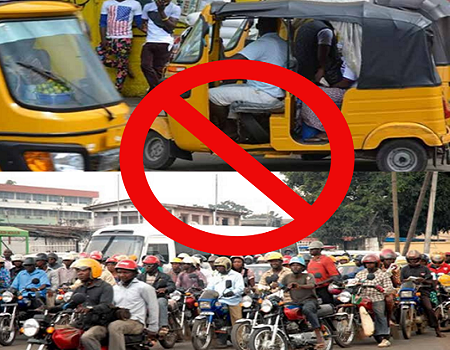LAGOS recently witnessed a major street protest under the Babajide Sanwo-Olu administration following the ban on okada (commercial motorcycles) in six local government areas (LGAs), nine local council development areas (LCDAs), 10 major highways and 40 bridges, flyovers and causeways in the state. The ban has directly threatened the livelihood of many okada riders, jeopardised the investments of transport platforms like MAX.ng and Gokada, and forced commuters to trek long distances. This is not the first time the Lagos State government has placed a ban on okada. In 2012, the state government under Babatunde Fashola enacted a law, the Lagos State Road Traffic Law of 2012, that banned okada from major highways in the state, restricting them to designated inner city roads. The recent ban which has been more sweeping demonstrates that the previous ban was observed in the breach. This was in spite of the effort of the state government to revise and streamline the law by enacting the Lagos State Transport Sector Reform Laws of 2018.
Indeed, the 2018 law and the Bus Reform Policy were purportedly provided to return sanity to the public transport sector in the state without addressing the chaotic nature and poor state of transport infrastructure in the mega city. The Bus Reform Policy (BRP) sought to create sanity on Lagos roads by enforcing discipline on vehicle drivers and commuters. It sought to make drivers wear uniforms and provide a code of conduct for both drivers and passengers. It also sought to restructure motor parks across the state in a way that keeps them free of the sale of alcohol and other illicit substances. The 2018 law sought to structure the operation of commercial buses, commercial motorcycles and tricycles and control the use and movement of trailers and long vehicles on Lagos roads. The law contained a list of transport offences, with punishments ascribed to each offence. The traffic law and regulations prohibited the operation of motorcycles and tricycles of 200cc engine capacity on major highways within Lagos State. It was the enforcement of a directive in furtherance of this law that has provoked the subsisting situation.
The enforcement of the ban, according to Mr Gbenga Omotosho, the state Commissioner for Information and Strategy, was to protect citizens from injury and death through accidents that have become rampant among commercial motorcycle and tricycle operators and for security concerns. According to him, over 10,000 accidents were recorded between 2016 and 2019 at the General Hospitals in the state involving over 600 deaths. The police have also recorded skyrocketing increase in crimes. Operators of commercial motorcycles often show no regard for traffic and road use regulations and have contributed in exacerbating the gridlock in the metropolis. In recent times, the police have often seized consignments of motorcycles with AK47 and AK-49 assault rifles and magazines concealed within them. Therefore, there is a need to regulate the activities of commercial motorcycles.
However, the government must have a comprehensive view of the problem and take measures that would touch the roots of the crisis. Transport in Lagos has been in a state of permanent crisis since the 1980s when the idea of developing a metro line system for Lagos State was first broached. Providing palliatives like the 65 or 600 buses announced by Governor Sanwo-Olu will only add to the congestion and traffic logjams being experienced in the city. The government cannot continue to underestimate the scale of the problem. It cannot continue to operate a knee-jerk policy. Lagos requires major interventions in the transport sector targeted at seamlessly moving millions of people daily. There have been efforts in the past that recognised this need. Previous governments mooted a plan to open up waterways. This proposal seemed, at least until very recently, to have been abandoned. The proposed Fourth Mainland Bridge has not seen the light of day. The Lagos-Badagry monorail has been ongoing without any hope of completion for over a decade. These failures have occurred in spite of the fact that Lagos State has had the privilege of being under a single political regime that should have guaranteed policy consistency. It is sad that a succession of governments since May 1999 have prioritised transport through roads and bus stops for a mega city teeming with millions of people. Many cities in Africa like Addis Ababa, Algiers, Cairo, Rabat, Casablanca and Alexandria, some of which do not have the financial clout of Lagos, have metro lines or tramways that move millions across them. It is a shame that the recurring solution for Lagos is okada ban.
The transport situation in Lagos must be addressed in a phased and systematic manner. The complaints by stakeholders should be accommodated as the government takes a second look at the ban on commercial motorcycles. Lagos will continue to be home to Nigerians who migrate to the city in search of greener pastures with the attendant pressure for urban services. Lagos is the commercial nerve centre of Nigeria and it requires a functional, efficient and effective mass transit rail system, not a transport system largely made up of buses erroneously called mass transit vehicles in Nigeria.






